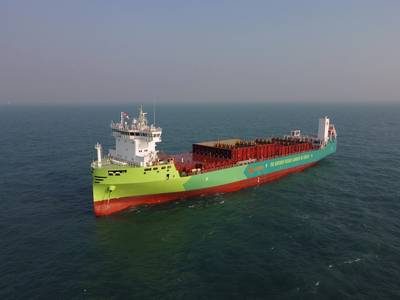On Monday, X-Press Feeders conducted its first bio-methanol refuelling operation at the port of Singapore. This follows the mid-May delivery of the first of 14 ordered dual-fuel vessels, according to a company executive.
The company plans to increasingly use methanol to power its fleet, aiming for a 20% reduction in carbon dioxide emissions by 2035 and achieving net-zero carbon emissions by 2050.
Bio-methanol, produced from decomposing organic matter such as waste and residues, can reduce carbon emissions by 65% compared to conventional marine fuel, stated Francis Goh, the chief operating officer at X-Press Feeders.
The company’s first dual-fuel vessel was delivered from a Chinese shipyard this month and is currently en route from Shanghai to Rotterdam via Singapore. It docked in Singapore on Monday, refuelling with approximately 300 metric tons of bio-methanol supplied by Global Energy Trading’s chemical bunker tanker.
This operation marked the first simultaneous methanol bunkering and cargo operation in Singapore, according to the port authority, enhancing productivity by reducing port time and speeding up ship turnaround, Goh explained.
X-Press Feeders plans to deploy its methanol-fueled feeder ships on a Baltic route in July and a Finland route in October. Goh noted that the European market is particularly receptive to such vessels due to its supportive regulatory environment.
Maersk conducted the first green methanol bunker operation in Singapore last July, followed by Stena Bulk last week.
X-Press Feeders will receive eight dual-fuel container ships between 2024 and 2025, and another six between 2025 and 2026. The company has agreements with six European ports to develop infrastructure for alternative fuel supply and bunkering.
As the world’s largest bunkering hub, Singapore has received 50 proposals for methanol supply, with the potential to supply over 1 million tons of low-carbon methanol annually by 2030.

